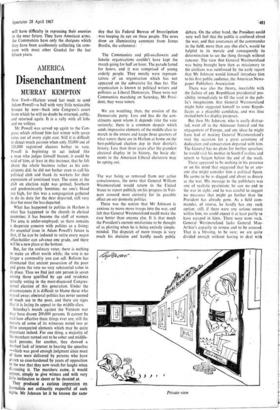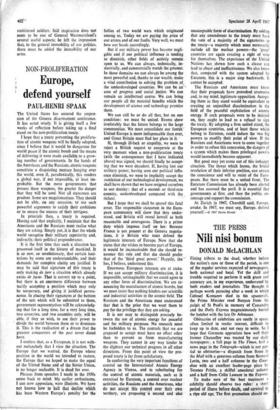Disenchantment
AMERICA MURRAY KEMP TON
New York—Harlem voted last week to send Adam Powell—a ball with very little noticeable bounce by now—back inter Congress's court from which he will no doubt be returned, softly, and returned again. It is a rally with all lobs and no volleys.
Mr Powell was served up again to the Con- gress which refused him last winter with seven votes out of every eight cast. Still it is difficult to detect much passion when only 33,000 out of 126,000 registered electors bother to vote. Powell is beginning to act indeed like a man who judges himself beaten; it could be said of him, at least in this instance, that he felt about the whole business rather as his con- stituents did; he did not bother even to call his political club and thank its workers for their expression of continued trust. The scene at the club on election night was genteel, Southern and predominantly feminine; no one's blood ran high, for this was a congregation gathered to do its duty for the dear departed, still very dear but none the less departed.
What has happened to politics in Harlem is what has happened to the church in clerical countries; it has become the stuff of women. The area is under-employed; so there remains a desperate concern with politics as a living; the essential'issue in Adam Powell's future is that, if he can be induced to retire every negro office-holder can advance one grade, and there will be a new place at the bottom.
But, for the ordinary voter, there is nothing to make an effort worth while; the vote is no longer a commodity you can sell. Reform has eliminated that ancient possession of the poor and given the vote no very substantial value in its place. Thus we find just one person in seven among those qualified by age and residence actually voting in the most-discussed Congres- sional election of this generation. Under the circumstances it is difficult to blame those who stayed away; electoral politics has never seemed of much use to the poor, and there are signs that it is losing its appeal to the middle class.
Saturday's march against the Vietnam war may have drawn 200,000 persons. It cannot be said how effective these things ever are; still the reports of some of its witnesses noted two or three unexpected elements which may be quite important indeed. For one thing, a majority of the marchers turned out to be sober and middle- aged persons; for another, they showed a marked lack of interest in hearing the speeches —which was good enough judgment since most of them were delivered by persons who have grown so-case-hardened by years of opposition to the war that they now reach for laughs when discussing it. The marchers came, it would aPPear, simply to give witness and with very little inclination to shout or be shouted at.
They produced a =ions impression on journalists not ordinarily respectful of such sights, Mr Johnson let it be known the same day that his Federal Bureau of Investigation . was keeping its eye on these people. The news drew an illuminating comment from James Breslin, the columnist: '
The Communists and pill-swallowers and lunatic organisations couldn't have kept the march going for half an hour. The parade lasted for hoOrs, and it was comprised of young orderly people. They mostly were represen- tatives of an organisation which has not appeared on the subversive list thus far. The organisation is known to political writers and pollsters as Liberal Democrats. These were not Communists marching on Saturday, Mr Presi- dent, they were voters.
We are watching, then, the erosion of the Democratic party. Less and less do the con- stituents upon whom it depends take the vote seriously; there is a common despair which sehds impressive elements of the middle class to march in the streets and keeps three quarters of what voters there are in Harlem at home on the best-publicised election day in their district's history. Less than three years after the grandest electoral display in its history, the basic ele- ments in the American Liberal electorate may be opting out.
The war being so removed from our active consciousness, the news that General William Westmoreland would return to the United States to report publicly on his progress in Viet- nam aroused most curiosity for its possible effect on our domestic politics. - There was the notion that Mr Johnson is anxious to move more troops into the war, and felt that General Westmoreland could make the case better than anyone else. It is that much the President's current misfortune to be thought of as plotting when he is being entirely simple- minded. The dispatch of more troops is' very much his decision and hardly. needs public debate. On the other hand, the President could very well feel that the public is confused about the war, and that assurances of the commander in the field, more than any dne else's, would be helpful to its morale and consequently its determination to see the thing through without rancour. The view that General Westmoreland was being brought here then as missionary to the civilians was reinforced by the early report that Mr Johnson would himself introduce him to his first public audience, the American News- paper Publishers Association.
There was also the theory, inevitable with the failure of arty Republican presidential pos-
sibility immediately to fill the void in the pub- lic's imagination, that General Westmoreland might hate suggested himself to some Repub- licans as a plausible candidate, and was thus invited hefe for display purposes.
But then Mr Johnson, who is easily distrac- ted, went off to the Adenauer funeral and the engagement of Europe, and any ideas he might have had of making General Westmoreland's visit the occasion for a great ceremony of dedication and consecration departed with him. The Genetal has no plans for further speeches; he would visit his mother in South Carolina and return to Saigon before the end of the week.
There appeared to be nothing in his presence or on his mind that suggested that he or any- one else might consider him a political figure. He seems to be as dogged and about as dreary as the war. His message to the publishers was one of realistic pessimism; he saw no end to the war in sight; and he was careful to suggest no measures that might go further than the President has already gone. As a field com- mander, of course, he hardly has any such option; still, if there were any serious unrest within him, we could expect it at least partly to have escaped in hints. There were none such. General Westmoreland lacks General Mac- Arthur's capacity to arouse and to be aroused. That is a blessing, to be sure; we are quite divided enough without having to deal with embittered soldiers. Still inspiration does not seem to be one of General Westmoreland's several useful aspects; he left the impression that, to the general immobility of our politics, there must be added the immobility of our arms.







































 Previous page
Previous page